The Golden Dawn or Thoth Method
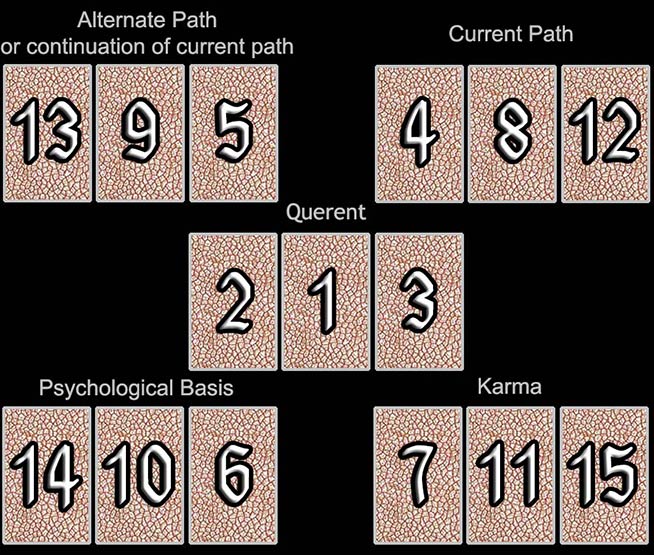
Difficulty: Complicated
Note: Tarot decks that use reversed cards such as the Rider-Waite do not work well with this spread, which was designed to be read using elemental dignity.
The Golden Dawn spread is best suited for use with the bifrost Tarot and especially the Book of Thoth, as these decks are meant to be read a certain way with the court cards. Princes and queens represent actual men and women connected with the matter, while princesses generally represent ideas; thoughts or opinions, and knights represent arrival or departure of a matter depending on the direction faced.
In this tarot spread, particular attention should be paid to a card's exact position in relation to its neighbours. Whether the neighbour cards bear the same energy (suit) determines whether a card is considered well-dignified or ill-dignified. Opposite suits ill-dignify each other, while other suits are considered friendly. Tarot cards of the same suit or element strengthen each other.
As with other tarot spreads, it is important to count the cards' tendencies, such as whether there is a lot of one particular suit or number pattern. The patterns reveal special messages. Having several majors present indicates higher forces at work, several cups suggest strong emotions, etc.
Card #1 represents the reader and the nature of the topic at hand.
Cards #2 & #3 are read in extension of #1 to further comprehend the nature of the topic.
The two sets of three tarot cards at the top of the spread represent chronological sets of events. The current path as it would unfold naturally is represented by cards #4, #8, & #12. The alternate path that could be taken is represented by cards #13, #9, & #5. However, if the reader gets the feeling these cards are telling them they go together, then the alternate path is to be considered an extension of the current path, and to be read chronologically in this order: #4, #8, #12, #13, #9, #5. Just keep in mind: this is only if the two paths seem particularly similar.
Cards #14, #10, & #6 shed light upon the psychological undertones of the current issue.
Cards #7, #11, & #15 represent the influences of karma and destiny beyond the reader's control. These cards suggest adapting to this, as fate.
Your Golden Dawn Reading
| The Alternate Path (or Extension of Current Path) |
Your Current Path |
|||||
Seven of Wands |
IV – The Emperor |
XX – Judgement, Reversed |
Nine of Wands, Reversed |
III – The Empress |
0 – The Fool, Reversed |
|
| The Querent | ||||||
Eight of Pentacles, Reversed |
Ten of Cups |
Ace of Swords |
||||
| The Psychological Basis | Karma | |||||
Ten of Wands |
XIX – The Sun, Reversed |
King of Pentacles, Reversed |
Ten of Swords, Reversed |
Seven of Swords |
Six of Swords |
|
The Querent
cards represent the querent and the nature of the topic at hand. The first card (in the center of the spread) represents the very core of the matter, and the other two cards around it are added to it in order to further comprehend the nature of the topic.
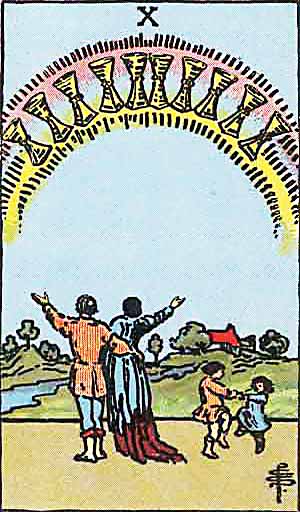
The Ten of Cups represents emotional harmony, lasting happiness, and the fulfilment of love and family. Depicted as a happy family or couple standing beneath a rainbow of ten cups, this card signifies the emotional fulfilment that comes from loving relationships, deep connections, and shared experiences. The Ten of Cups suggests you have achieved or are on the verge of experiencing a time of emotional peace when love, happiness, and emotional security flourish. It reflects unity and alignment with yourself and those closest to you.
This card embodies emotional completion, where all the pieces of the puzzle fall into place, and you feel a deep sense of gratitude and contentment. The Ten of Cups emphasises that emotional fulfilment is most meaningful when shared with loved ones, and it encourages you to cherish your relationships, creating peace and love within the family. It suggests emotional balance and joy are possible, not through external achievements alone, but through genuine connection, mutual respect, and love.
In Relationships: The Ten of Cups is one of the most positive cards, indicating emotional fulfilment, joy, and harmony. It may suggest that you are in or will soon experience a satisfying romantic relationship characterised by mutual love, support, and happiness. For those in committed partnerships, the Ten of Cups represents a time of growth and emotional connection when both partners are aligned and working together towards common goals. It may also suggest the possibility of starting a family. For singles, the Ten of Cups indicates that love and emotional fulfilment are within reach, suggesting that you may soon meet someone who brings you joy and companionship.
In Work: The Ten of Cups represents fulfilment through work that brings emotional satisfaction and harmony. It suggests you are in a position where you feel emotional contentment in your professional life, perhaps through collaboration, teamwork, or working for a cause you believe in. The Ten of Cups indicates that genuine success is not just about external accomplishments, but also about feeling valued, appreciated, and engaged with your work. This card may also reflect a work environment that feels like a family, where there is support, trust, and belonging. The Ten of Cups encourages you to find work that aligns with your emotional well-being, where you can experience fulfilment and joy in what you do.
Spiritually: The Ten of Cups represents alignment with one's higher self and a sense of peace and fulfilment in the spiritual realm. It suggests you have reached a state of spiritual harmony and connection, where you feel emotionally balanced, at peace, and in tune with the divine. This card encourages you to nurture your connections, whether through family, community, or personal practice, as it brings you a sense of fulfilment. It may also indicate a time when you feel emotionally supported and connected to the universe.
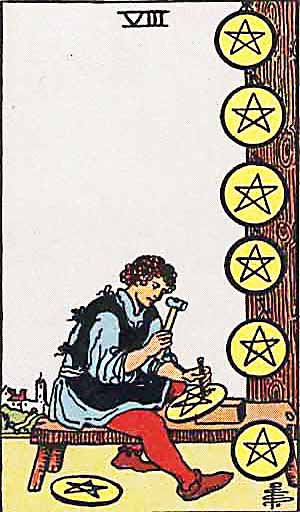
The Eight of Pentacles represents diligence, mastery, and concerted effort. This card embodies the energy of hard work, skill-building, and dedication to one's craft. It depicts a figure working hard at their craft, chiselling away at a piece of wood or metal, focusing intently on their task. The Eight of Pentacles suggests you are putting in the work and effort to improve your skills, whether in your career, creative endeavours, or personal development. It speaks to the importance of perseverance and the value of continuous learning and improvement.
Reversed, the Eight of Pentacles may indicate a lack of focus, poor work habits, or feeling stuck in a repetitive cycle. You may be struggling with motivation, feeling overwhelmed by the task at hand, or not putting in the effort to achieve your goals. It can also suggest a tendency to cut corners, be careless, or avoid the work required for growth. The reversed Eight of Pentacles advises you to assess whether you are committed to your work and evaluate if your efforts are aligned with your long-term goals. It may also suggest the need to re-evaluate your approach or seek guidance to go forward with more clarity.
In Relationships: The Eight of Pentacles suggests you may be putting in significant effort to nurture and grow your relationship. This card indicates you are dedicated to making the relationship work, focusing on improving communication, understanding, or other important aspects. It may also suggest that you are working through challenges or learning more about your partner, to build a deeper and more lasting connection. The Eight of Pentacles encourages you to work to cultivate love, whether by making small efforts to show affection, communicating openly, or working together to resolve conflicts. Success in love, like any other endeavour, requires attention, care, and a commitment to growth.
In Work: The Eight of Pentacles signifies concerted effort, where you are dedicating yourself to improving your skills or advancing in your profession. This card suggests you are in a phase of apprenticeship or learning, perhaps acquiring new knowledge or expertise to further your career. It may indicate that you are refining your craft, mastering a particular aspect of your job, or working diligently to complete a project with a high level of quality. The Eight of Pentacles encourages you to continue to dedicate yourself to your work, as success in this area will come from consistent effort, attention to detail, and a commitment to personal growth. The card may also suggest you are on the path to becoming an expert in your field, with the potential for recognition or achievement.
Spiritually: The Eight of Pentacles represents a time of disciplined effort and growth in one's spiritual practice. It is a time when you dedicate yourself to improving your understanding or honing your spiritual practices. This card suggests you are engaged in learning, whether studying sacred texts, meditating regularly, or engaging in rituals or practices that deepen your connection to the divine. The Eight of Pentacles encourages you to remain dedicated and patient, as spiritual growth requires ongoing effort and the willingness to refine your approach. The card reminds you that spiritual mastery is a continuous journey and each small step contributes to greater understanding.
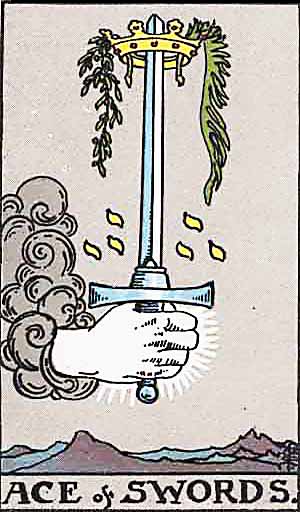
The Ace of Swords represents clarity, truth, and mental breakthroughs. As the embodiment of raw intellectual power, this card signifies the arrival of new ideas, insights, or a moment of sudden realisation that cuts through the confusion. The sword, as a symbol of intellect and communication, shows that you are being presented with a fresh perspective, the potential for mental clarity, or an opportunity to engage with truth clearly and directly. The Ace of Swords offers the energy of a sharp mind, clear intentions, and the ability to face challenges with a straightforward approach.
This card invites you to embrace the power of your thoughts, speak your truth, and cut away illusions or falsehoods. The Ace of Swords suggests that a moment of intellectual clarity or a new idea could lead to a major shift in how you view your situation or the world. It is a time when the mind is open and ready to absorb new knowledge or solve problems that once seemed insurmountable. The Ace of Swords encourages you to use your intellect and communication skills boldly, trusting that truth and reason will guide you to success.
In Relationships: The Ace of Swords represents clear communication, honesty, and truth. This card signals a time when you or your partner may need to have an important conversation that cuts through misunderstandings or brings clarity to a situation. The Ace of Swords encourages you to speak your truth openly and directly, clearing the air and removing any confusion or deception. This card may also indicate a breakthrough in understanding each other's needs or desires, where clarity leads to a stronger emotional connection. The Ace of Swords reminds you that honesty is essential in love and that addressing hard truths with clarity can bring about profound change and growth.
In Work: The Ace of Swords suggests a new intellectual breakthrough or a fresh idea that could lead to success. It may signify the beginning of a new project, endeavour, or direction in the professional realm based on strategic thinking and clear communication. This card encourages you to use your mental abilities to tackle problems, solve challenges, and move forward confidently. The Ace of Swords often indicates the start of something where clarity of purpose and mental focus are key. You may be called to speak up, lead with logic, or bring a new perspective to your career, potentially leading to greater success.
Spiritually: The Ace of Swords signifies clarity of thought and the pursuit of truth on a deeper level. This card indicates you may experience a moment of spiritual awakening or a surge of insight that cuts through confusion or previous misconceptions. The Ace of Swords invites you to seek truth, challenge old beliefs, and engage with spirituality from a place of intellectual clarity and personal integrity. This card also encourages you to embrace the power of your mind in your spiritual practice, suggesting that mental clarity and an open mind are essential for spiritual growth. It represents the potential for enlightenment, where new understanding can lead to profound transformation.
Your Current Path
cards represent your current path as it would unfold naturally. These cards are read in chronological order from left to right.
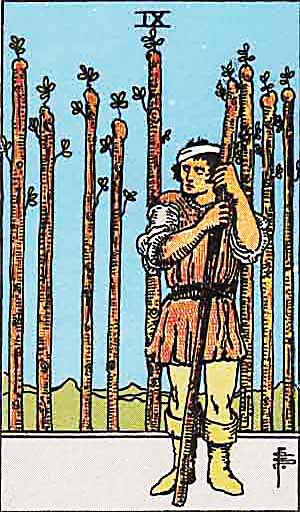
The Nine of Wands represents resilience, perseverance, and the strength to endure adversity. The ninth card in the Suit of Wands indicates that you have been through a series of challenges or struggles but are still standing strong, holding on to what you have worked for. Depicted as a figure standing defensively, with one wand raised and a weary expression, the Nine of Wands shows a person who has been through a battle, yet continues to guard their position. This card suggests you are at a critical juncture, where your ability to withstand your trials will determine whether you can achieve the eventual success you seek.
Reversed, the Nine of Wands can indicate feeling overwhelmed, burnt out, or unable to continue pushing forward. You may be struggling to maintain your energy or feeling like you've reached your limit. The reversed Nine of Wands may also suggest that you have become overly defensive or guarded, possibly even shutting others out or losing trust. This card warns against giving up too easily, as you may be closer to your goal than you realise. It encourages you to reassess your boundaries and seek ways to replenish your energy and spirit before continuing. It may also point to the need to ask for support, as trying to endure everything alone may not be sustainable.
In Relationships: The Nine of Wands indicates emotional exhaustion or defensiveness in the relationship. You or your partner may have been through emotional challenges, possibly involving past hurts, misunderstandings, or relationship struggles. This card suggests there is still a desire to protect the relationship, but it also indicates that one or both parties may feel worn out by the emotional toll. The Nine of Wands encourages you to maintain your boundaries and stay resilient, but to avoid becoming too defensive or shutting down. For those in a difficult or testing relationship, this card advises perseverance and faith in the relationship's potential for growth and healing. It also asks you to be aware of emotional fatigue and ensure you are not staying in a situation solely out of a sense of obligation.
In Work: The Nine of Wands suggests you have been through a series of struggles or obstacles in your professional life. You may feel the weight of setbacks or the pressure to maintain your success. This card encourages you to stay resilient and trust in your ability to overcome the final hurdles. While you may feel tired or worn down, the Nine of Wands indicates you are close to achieving your goals and that one last push of effort may be needed to achieve success. It is also a reminder to remain cautious and guard against burnout, as your energy levels may be low. The Nine of Wands advises you to pace yourself, acknowledge how far you've come, and use your inner strength to push through the last challenges.
Spiritually: The Nine of Wands represents a time when you are testing your endurance and strength. This card suggests you may feel weary or worn out, having faced trials or challenges on your spiritual journey. However, the Nine of Wands encourages you to remain steadfast and trust that you are close to a breakthrough. It signifies the need to continue on the spiritual path, even when things seem difficult or uncertain. You are urged to tap into your spiritual reserves and maintain your faith, knowing that perseverance will lead to greater insight and growth. The Nine of Wands also suggests the need for spiritual protection, reminding you to guard your energy and remain resilient in the face of challenges.
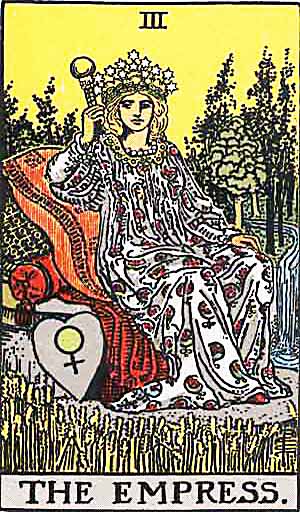
The Empress represents fertility, abundance, nurturing, and creativity. This card embodies the power of creation in all its forms, whether the birth of new ideas, projects, or actual life. The Empress sits upon a throne adorned with symbols of nature, such as a crown of stars and a field of grain, indicating her connection to the natural world. She exudes warmth and compassion, representing the qualities of motherhood, care, and emotional support. She is a symbol of nurturing energy, encouraging growth and the flourishing of all that is tended to with love and patience.
Her flowing robes and the abundance of the natural world around her signify that the Empress brings prosperity and well-being. She holds a sceptre, symbolising her dominion over the material world, and sits amidst lush greenery, suggesting that fertility and growth are hers to command. The Empress represents the creative force that can transform ideas into tangible forms. She reminds us of the importance of self-care, nurturing others, and the healing power of love and empathy.
In Relationships: The Empress signifies a time of nurturing and care. It suggests that love will flourish when both partners express their emotions and support each other's growth. This card can indicate a deep, loving connection, or emotional abundance in one's romantic life. It may also point to the potential for starting a family, deepening commitment, or creating new foundations in relationships. The Empress reminds you to embrace love with an open heart and a spirit of generosity.
In Work: The Empress signals a time of creativity and growth in one's professional life. It suggests that hard work and nurturing will lead to fruitful results. This card can also indicate a period of abundance, where new opportunities will manifest. The Empress encourages you to care for your projects with patience and love, as this will lead to lasting success. She may also point to the importance of self-care and work-life balance to sustain long-term achievement.
Spiritually: The Empress represents the divine feminine energy and the spiritual aspects of nurturing, creativity, and abundance. It invites you to embrace your creative potential and nurture your inner growth. This card calls for a heart open to the blessings of the universe. The Empress also encourages connection with nature for spiritual nourishment. She embodies the nurturing force of the universe, reminding us that creation begins with love and care.
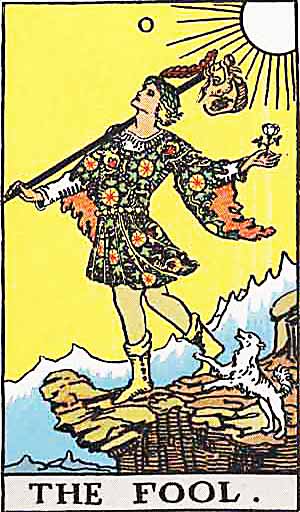
The Fool represents the beginning of an inner and outer journey, a leap of faith into the unknown where infinite possibilities lie. This card embodies potential and purity. It represents the spirit of new beginnings before experience has shaped the self. The Fool carries a light knapsack, signifying that experiences or material attachments do not burden him. His innocence and openness suggest a state of trust in the universe and a readiness to take risks, unafraid of the unknown.
Reversed, the Fool can indicate a fear of stepping into the unknown, an avoidance of change, or a reluctance to take risks. It may suggest that you are holding back from starting a new journey because of doubts, insecurities, or an overreliance on the familiar. The Fool reversed warns against acting impulsively, leading to unnecessary mistakes. It can also signal naivety or a lack of preparedness when faced with challenges, urging you to approach new beginnings more responsibly.
In Relationships: The Fool invites openness, spontaneity, and fresh starts. This card suggests embarking on new romantic experiences without the weight of baggage. It encourages you to approach love with an open heart, ready to explore new connections and uncharted territory. The Fool signifies trust, freedom, and the joy of new beginnings, free from inhibitions.
In Work: The Fool signals a new chapter in one's professional life. It may indicate the start of an exciting journey or project, urging you to embrace change and take a risk for growth and fulfilment. This card encourages stepping out of your comfort zone, trusting that the journey will bring valuable experiences and opportunities despite an uncertain future. The Fool advises boldness and enthusiasm in pursuing career goals, suggesting that success may come from breaking away from conventional paths.
Spiritually: The Fool represents the call to venture beyond the ego, to explore new realms of consciousness and self-awareness. This card invites you to embrace the spiritual journey with innocence and trust, letting go of preconceived notions or rigid beliefs. The Fool encourages surrender to the flow of the universe, letting go of control, and embracing the unknown with faith. It is a reminder that the spiritual path is not about certainty, but the willingness to explore and discover.
The Alternate Path
cards represent the alternate path that you could choose to take in lieu of the Current Path. However, if the cards that come up seem to indicate that they go along with the Current Path, these three cards should be interpretted not as an Alternate Path, but as a chronological extension of the Current Path (also read from left to right).
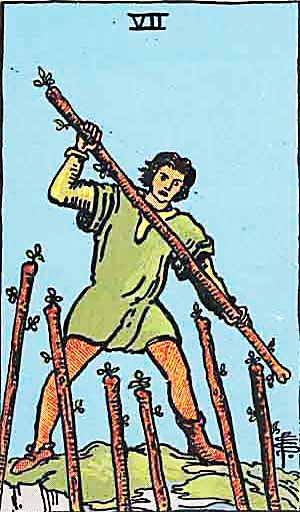
The Seven of Wands represents perseverance, defence, and standing your ground in the face of challenges. It indicates a time when you are confronted with competition, opposition, or criticism, but must remain firm and assertive in protecting your position or beliefs. Depicted as a figure standing on higher ground, holding a wand to defend themselves against several others below, the Seven of Wands suggests rising above obstacles and confronting adversity head-on. This card calls for courage and determination, encouraging you to defend what you have achieved or believe in when it feels like others are challenging you.
The Seven of Wands speaks to a moment where you may feel like you are being attacked or overwhelmed by external forces. However, the figure's elevated position suggests that with the right mindset and perseverance, you have the advantage. This card encourages you to remain steadfast in your actions and decisions, knowing you are in a position to succeed despite the opposition. It reminds you to trust in your abilities and be confident that you can overcome any challenges that arise.
In Relationships: The Seven of Wands indicates tension or rivalry. This could manifest as external pressures, such as family or friends interfering, or internal struggles where both partners may experience differing needs or desires. You may need to stand your ground in protecting the relationship or asserting your boundaries. This card encourages you to remain firm and assertive in your beliefs about love and relationships, even if you face opposition from others. It may also suggest that you must fight for your connection, whether confronting misunderstandings or pushing back against external forces that threaten your unity. For single individuals, the Seven of Wands can indicate the need to stay true to your values and not be swayed by external influences in romance.
In Work: The Seven of Wands signals a time when you may be facing competition, criticism, or challenging circumstances. This card suggests you are in a position of advantage, but you must defend your place to maintain your success. The Seven of Wands indicates you will face obstacles, but it encourages you to remain strong, assertive, and confident in your abilities. It may point to the need to stand up for your ideas, work, or career goals, especially when others question or oppose them. This card advises you to avoid complacency and engage with challenges, knowing that overcoming them will only strengthen your position. It is a reminder that success often requires persistence and the ability to rise above opposition.
Spiritually: The Seven of Wands indicates a time of spiritual challenge or inner conflict, where you may feel the need to defend your spiritual beliefs or practices. The card suggests you are on a path that may be difficult to navigate, and you may face external criticism or doubt from others. However, the Seven of Wands encourages you to remain firm in your spiritual convictions and trust that you are on the right path. It also suggests you may need to stand up for your beliefs, even if you feel isolated or misunderstood. This card encourages inner strength and the courage to defend your truth while remaining open to growth and deeper understanding on the spiritual journey.
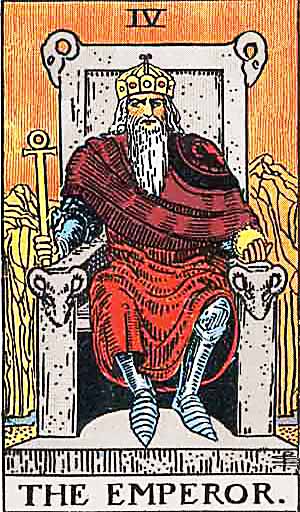
The Emperor represents authority, structure, leadership, and stability. As the fourth card of the Major Arcana, it embodies order, discipline, and the ability to create and maintain systems that provide security and success. Sitting upon a grand throne adorned with ram's heads, symbols of strength and leadership, the Emperor exudes power. He is the ruler of his domain, symbolising mastery over the material world and the ability to make decisions confidently. His crown and sceptre reinforce his role as a sovereign figure who governs with authority.
The Emperor is a symbol of structure and organisation, signifying the need for discipline and clear boundaries. He encourages taking responsibility, setting goals, and leading with strength and integrity. The Emperor calls for action grounded in practical wisdom and a solid understanding of the frameworks that govern our lives. His presence indicates the importance of authority in achieving long-term success and the need to stand firm in your beliefs and decisions.
In Relationships: The Emperor represents stability, security, and leadership. It suggests that a solid foundation is necessary for a relationship to thrive. You may be called upon to take on a more protective or responsible role or seek a partner who offers stability and structure. This card can also signify the need for boundaries and mutual respect within a relationship. The Emperor emphasises the importance of leadership and protection.
In Work: The Emperor is a powerful card of success, structure, and authority in the professional realm. It suggests you may be in a position of leadership or will soon be called to take charge of a situation or project. This card encourages discipline, responsibility, and strategic planning in career goals. The Emperor advises you to approach your work with a strong sense of organisation and control, building a foundation to support long-term growth and achievement. Success is likely through creating order and taking decisive, informed action.
Spiritually: The Emperor represents the manifestation of spiritual authority and the use of disciplined energy to create structure and order in one's spiritual practice. It invites you to approach your spiritual journey with focus and responsibility. This card suggests that spiritual growth can be achieved through setting intentions, building a solid foundation, and taking determined action. The Emperor also calls for integrating spiritual teachings into everyday life, using wisdom and strength to create stability.
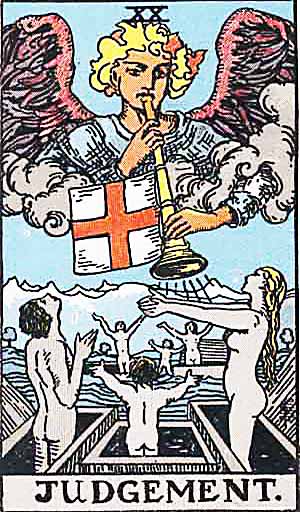
Judgement represents self-reflection, transformation, and the call to a higher purpose. The twentieth card of the Major Arcana signifies a time of awakening, a moment of reckoning where you are invited to confront your actions, decisions, and beliefs. An angel blowing a trumpet with people rising from their graves to meet their divine call symbolises the opportunity for a fresh start or renewal through self-assessment and spiritual awakening. This card encourages you to reflect on your life, learn from mistakes, and answer the call to grow into a higher version of yourself.
Reversed, Judgement can indicate a fear of change, self-doubt, or an unwillingness to confront past actions or mistakes. It may suggest you are avoiding necessary self-reflection, clinging to old habits, or resisting the call to grow. The reversed Judgement card warns against ignoring the lessons of the past and encourages you to face unresolved issues or feelings to move forward. It may also indicate a time when you are struggling to release guilt, shame, or regret, preventing you from experiencing the transformation and renewal necessary for growth. This card urges you to let go of fear, embrace forgiveness, and trust in the process of personal transformation.
In Relationships: Judgement indicates a period of self-reflection, where both partners may need to take stock of their actions and experiences. It encourages healing and growth, suggesting that the relationship may undergo a transformative process through open communication, forgiveness, or a fresh perspective. Judgement invites you to release emotional baggage, forgive yourself and your partner, and move forward with greater understanding. This card can also signify a new beginning or a renewed sense of purpose within a relationship, where both partners answer the call to create a deeper, more fulfilling bond. For those who are single, Judgement may indicate a time of inner awakening that leads to the readiness for a new, transformative relationship.
In Work: Judgement represents a moment of self-assessment, where you may feel called to evaluate your professional life and consider whether you are on the right path. This card suggests a time of transformation, when you can release old habits, attitudes, or ways of working that no longer serve you. It may also indicate a turning point where a decision or action comes to fruition, bringing about an important opportunity or revelation. Judgement calls you to embrace your potential and step into a new phase of your career, free from limiting beliefs or fears. This card may also suggest the need for a radical change in your work life, encouraging you to pursue a career path aligned with your soul's purpose.
Spiritually: Judgement represents a call to awaken to a higher level of consciousness and self-awareness. It signifies a time when you are being invited to reflect on your spiritual journey, reconcile with the past, and embrace the opportunity for rebirth and transformation. This card encourages you to shed old beliefs, let go of guilt or judgement, and move forward with a clear sense of purpose and alignment with your soul's true calling. Judgement is a reminder that spiritual growth often involves moments of reckoning, where one confronts their actions and choices to develop into a more enlightened being. It signals that you are ready to embrace your higher self and live a life that reflects your spiritual path.
The Psychological Basis
cards shed light upon the psychological undertones of the current problem.
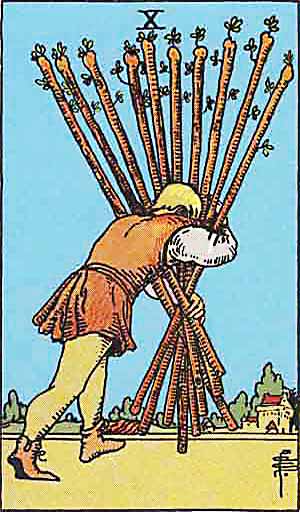
The Ten of Wands represents burden, responsibility, and being weighed down by obligations. It signifies a period of overwhelming pressure or exhaustion, where you may feel like you are carrying a heavy load—physically, emotionally, or mentally. Depicted as a figure struggling under the weight of ten wands, the Ten of Wands symbolises the final stages of a journey or project, where you have taken on more than you can handle. This card suggests that while you may have worked hard and put in a great deal of effort, you are reaching a point where you need to reconsider your responsibilities and seek balance.
The Ten of Wands speaks to the burden of overwork, excessive responsibilities, or being overwhelmed by tasks and commitments. While the card indicates that you have come far and made progress, it also points to the need to take a step back and assess whether you are carrying too much. It encourages you to consider delegating tasks or seeking support to lighten your load. The Ten of Wands serves as a reminder that sometimes, pushing forward without considering the cost to your well-being can lead to burnout, and it's important to know when to ask for help or release some of the burden.
In Relationships: The Ten of Wands suggests you or your partner may feel overwhelmed by the demands of the relationship or by external pressures affecting the connection. The card may indicate that the relationship has become burdensome, with one or both partners carrying too much emotional weight or responsibility. This card calls for a reassessment of the balance within the relationship, urging you to communicate freely and seek ways to share the load more equally. For those in a healthy relationship, the Ten of Wands may signal a temporary period of stress or difficulty, but it suggests you may need to step back to prevent burnout. For single individuals, this card may indicate that you carry emotional baggage from old relationships weighing heavily on you. The Ten of Wands encourages you to release old burdens to move forward with a clear heart.
In Work: The Ten of Wands suggests you may feel overburdened by work, responsibilities, or commitments. This card can indicate that you have taken on too much and are struggling to keep up with the demands of your job, project, or professional life. While you may be dedicated and hardworking, the Ten of Wands warns that you may be sacrificing your well-being. It's a reminder that overwork can lead to burnout and that it's important to delegate tasks, ask for help, or re-prioritise to manage responsibilities more effectively. The Ten of Wands may also indicate that you are at the final stages of a long-term project, and while the finish line is in sight, it is important not to neglect self-care or well-being during this last push. This card encourages you to find ways to lighten your load to avoid physical or emotional exhaustion.
Spiritually: The Ten of Wands signifies a time when you may feel weighed down by your spiritual practices, responsibilities, or beliefs. This card can indicate that you feel overwhelmed by spiritual obligations or carry the weight of spiritual wounds. The Ten of Wands calls for you to evaluate your spiritual journey and consider whether you are trying to shoulder too much on your path. It may suggest that you need to release unnecessary burdens or limiting beliefs to find peace and balance. The card encourages you to focus on self-care and not overextend yourself, as this can lead to feelings of burnout or exhaustion. It is also a reminder that the spiritual path should not feel like a chore, but a source of inspiration, growth, and renewal.
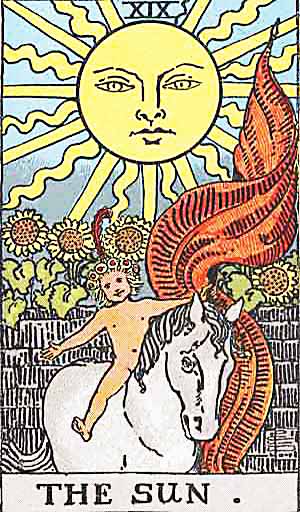
The Sun represents vitality, success, joy, and clarity. This card embodies the life-giving energy of the sun, symbolising illumination, abundance, and a time of personal growth and flourishing. A radiant sun shining down on a child riding a horse signifies optimism, confidence, and clarity. It invites you to bask in the warmth of positivity, truth, and success, indicating that your path is now clear and full of potential. The child symbolises innocence, pure joy, and the freedom to experience life with openness and enthusiasm, while the horse represents strength and forward movement.
Reversed, the Sun can indicate self-doubt, pessimism, or a lack of clarity. It may suggest that you are struggling to see the positive side of a situation or experiencing a temporary setback in your confidence or energy. The reversed Sun may also indicate a delay in success or feeling disconnected from your true self. This card urges you to confront negative thought patterns, release fears, and seek clarity to move forward. It encourages you to focus on what is going well, rather than dwelling on challenges, and reconnect with your inner light. The reversed Sun can also signal a need for more self-care, reflection, or a break to restore vitality and optimism.
In Relationships: The Sun signifies happiness, clarity, and mutual understanding. It suggests the relationship is in a positive phase, where both partners are experiencing joy, harmony, and fulfilment. This card encourages open communication, playfulness, and celebration and may indicate a time of growth, commitment, or a deepening of the bond. The Sun also highlights the importance of self-love and confidence, suggesting that when you are happy with yourself, your relationship will reflect this positive energy. It can also indicate a new love or a fresh start in a current relationship.
In Work: The Sun signals a time of achievement, recognition, and progress. It indicates that your hard work is paying off, and you are experiencing success in your professional life. This card encourages you to continue pursuing your goals optimistically, as you are on the right path towards fulfilment. The Sun represents a clear direction, signalling that now is an excellent time to take bold action, share ideas, or step into the spotlight. It suggests new opportunities may arise, bringing abundance and growth. This card also highlights the importance of enjoying the journey, finding joy in the work, and celebrating achievements, both big and small.
Spiritually: The Sun represents enlightenment and personal growth. This card signifies a time when your spiritual path is illuminated, offering a clear understanding of your purpose and connection to the divine. The Sun encourages you to embrace your authentic self, shine your light brightly, and approach life with joy, positivity, and openness. It indicates a time of spiritual awakening or a period of growth where you feel connected to your higher self and the universe. The Sun reminds you that the truth is always available and that by embracing it, you can achieve spiritual fulfilment and enlightenment.
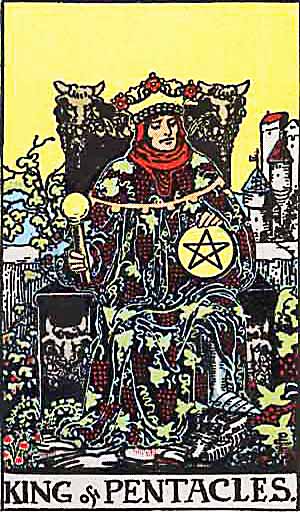
The King of Pentacles represents mastery, success, and the ability to create and maintain long-term prosperity. He embodies the qualities of discipline, ambition, and practical wisdom, using his resources to build a stable and abundant life. Seated on a throne surrounded by symbols of wealth, such as a crown, a sceptre, and lush greenery, the King of Pentacles signifies someone who has achieved financial security and is now focused on maintaining and expanding that success. He is a figure of authority, leadership, and reliability, representing someone grounded who understands the material world.
Reversed, the King of Pentacles can indicate financial instability, greed, or an overemphasis on material pursuits at the expense of emotional or spiritual well-being. You may be struggling with mismanagement of resources, a lack of discipline, or an inability to create the stability you desire. This card may also suggest a tendency towards controlling or domineering behaviour, especially in relationships or career matters, or a lack of generosity despite having resources. The reversed King of Pentacles warns against becoming too focused on wealth and status, reminding you to balance material success with the need for emotional and spiritual fulfilment. It may also signal the need to reassess how resources are being managed.
In Relationships: The King of Pentacles signifies a reliable and responsible partner. This card suggests a partner committed to building a secure and lasting future together. The King of Pentacles represents someone who provides for their loved ones, not just financially but also emotionally and practically. For those seeking love, this card may indicate that a partnership with someone who shares similar values of security, stability, and long-term commitment is on the horizon. The King of Pentacles reminds you to approach love with responsibility and maturity, understanding that a successful relationship requires emotional investment and practical effort.
In Work: The King of Pentacles represents financial stability, success, and leadership. This card signifies the achievement of wealth, professional mastery, and the ability to manage resources skillfully. You may be in a position of authority, such as a business owner, CEO, or manager, or striving to reach such a position. The King of Pentacles encourages you to focus on building a solid and sustainable career, using your experience and knowledge to make wise financial decisions. This card also highlights the importance of responsibility and the ability to take care of both practical and material matters in a way that benefits not only oneself but also others, whether through mentorship, business ventures, or leadership.
Spiritually: The King of Pentacles represents grounded wisdom and stability in one's spiritual practice. This card suggests you have achieved balance and security in your spiritual life, understanding that fulfilment comes from integrating spiritual wisdom with practical action. The King of Pentacles invites you to approach your spiritual journey with discipline and focus, applying the lessons you've learned to create a stable and harmonious life. The card may also indicate that you are in a position to help others grow or have the wisdom to guide others on their path, using both practical and spiritual knowledge to create lasting change.
Karma
These cards represent the influences of karma and destiny that are beyond your control. They suggest adapting to this fate.
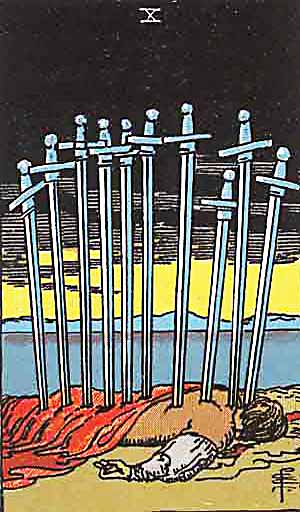
The Ten of Swords represents painful endings, betrayal, and hitting rock bottom. This card signals a time of tremendous distress, often indicating that a situation has reached its peak of destruction, and the only way out is through the aftermath. The image depicts a figure lying face down with ten swords piercing their back, symbolising the ultimate betrayal or defeat. The Ten of Swords signifies a crisis or a moment where you feel like everything falls apart, and you are at the lowest point possible. However, it is important to note that the Ten of Swords also marks the completion of a cycle, meaning that while the end is painful, it is also the beginning of a new chapter.
Reversed, the Ten of Swords suggests that the worst of the pain has passed, and you are beginning to heal from a difficult situation. The reversal indicates that you are emerging from emotional or mental distress, and the worst is behind you. While the scars may remain, this card encourages you to focus on recovery, understanding that the healing process is underway. It may also suggest that you are still in the final stages of letting go of a painful situation, but knowing that a new chapter is beginning and that you have the strength to move forward.
In Relationships: The Ten of Swords suggests the painful end of a relationship, possibly involving betrayal, dishonesty, or emotional devastation. You may experience the finality of a breakup, a sense of loss, or the painful realisation that a relationship is no longer serving your well-being. This card indicates a time of heartache but also signals the end of a difficult emotional journey. The Ten of Swords urges you to release any attachment to the past and allow yourself the time and space to heal. While this card represents a painful ending, it also holds the promise of emotional liberation and the opportunity to rebuild your sense of self and open yourself up to future relationships.
In Work: The Ten of Swords represents a significant failure, burnout, or the collapse of a professional endeavour. You may have experienced a career setback, loss of a job, or the failure of a project. This card signals the end of a phase in your work life, often due to betrayal, poor decisions, or circumstances beyond your control. While the Ten of Swords can represent a moment of defeat, it also suggests this is the conclusion of a difficult chapter. The card encourages you to accept the end of the situation and focus on the lessons learned, knowing that from this point forward, you can move on to more fulfilling professional opportunities.
Spiritually: The Ten of Swords indicates spiritual crisis, despair, or the shattering of old beliefs. You may be going through an intense period of doubt, loss, or a profound sense of disconnection from your spiritual path. This card represents the breaking down of old structures and ways of thinking, which can feel devastating but is necessary for growth. The Ten of Swords invites you to embrace this spiritual death and let go of outdated beliefs or attachments that no longer serve you. Though painful, this is an opportunity for rebirth, allowing you to reconnect with your true self and the divine.
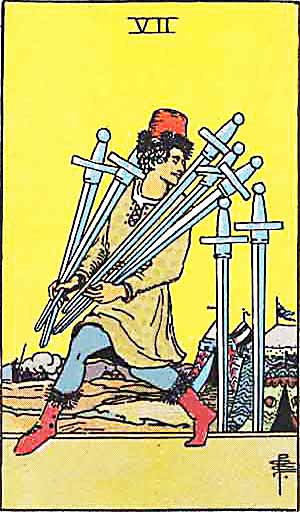
The Seven of Swords represents secrecy, deception, and strategic thinking. This card suggests you may be dealing with a situation where there is dishonesty, hidden motives, or someone trying to outsmart others. It indicates a need for caution and careful consideration, as things may not be as they appear on the surface. The image shows a figure sneaking away with swords, symbolising the act of taking what isn't freely given or trying to avoid detection. This card invites you to examine situations in which deception, avoidance, or evasion may be at play, whether from you or others.
While the Seven of Swords can indicate betrayal or trickery, it can also represent the need for cleverness and resourcefulness in difficult situations. Sometimes, this card suggests you rely on your wits and think outside the box to overcome challenges. It encourages strategic action, where you must be cautious about your approach, and mindful of how others may perceive your intentions. The card may also suggest a situation where you keep something to yourself for protection, advantage, or personal reasons. The Seven of Swords is a reminder to stay alert, gather the facts, and trust your intuition before making decisions.
In Relationships: The Seven of Swords suggests there may be secrets, dishonesty, or hidden agendas. This could be a situation where one partner is deceptive, hiding important information, or avoiding confrontation. Alternatively, it may point to hiding your feelings or avoiding an honest discussion about the relationship. The Seven of Swords calls for you to pay attention to what may not be said or seen, encouraging you to approach the relationship with awareness and discernment. If there is deceit, the card urges you to confront the truth and seek open communication. On the other hand, it may also suggest the need to be more transparent in your actions or to carefully consider the consequences of keeping things hidden.
In Work: The Seven of Swords can indicate dishonesty, theft, or unethical behaviour in the workplace. It may suggest that someone is trying to take credit for someone else's work, using manipulative tactics, or engaging in underhanded behaviour to achieve their goals. This card advises you to be cautious and observant of your professional dealings, as deceit or betrayal may be occurring. Alternatively, the Seven of Swords may suggest you adopt a more strategic, clever approach to achieve success, relying on your ability to navigate tricky situations with discretion and tact. The card encourages you to consider the ethical implications of your actions and avoid shortcuts that could lead to negative consequences.
Spiritually: The Seven of Swords suggests a need for greater honesty with oneself, as well as the potential for self-deception or avoidance of spiritual truths. This card invites you to examine areas of your life where you may be hiding from deeper issues or avoiding the truth. It may also indicate that you are relying on cleverness or avoidance rather than confronting your spiritual challenges directly. The Seven of Swords encourages you to reflect on whether you are being truthful in your spiritual practice and seek clarity in areas of your life that may be clouded by dishonesty or denial. It is a reminder that spiritual growth comes from facing the truth.
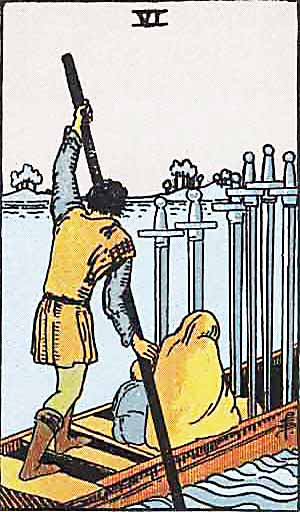
The Six of Swords represents moving forward from a difficult situation. This card signals leaving behind a time of hardship or emotional turbulence and heading towards calmer, more peaceful waters. It suggests you are healing or recovering from a challenging experience, and while the road ahead may still require effort, there is relief and optimism as you start moving forward. The image depicts a figure traveling across a body of water in a boat, with swords representing the mental challenges or emotional baggage left behind.
The Six of Swords is a card of progress and recovery, encouraging you to leave behind what no longer serves you and focus on the promise of a new beginning. It reminds you that while the past may have been difficult, the future holds the potential for growth and peace. This card encourages you to embrace change, even if it is uncomfortable, knowing that moving forward will bring you closer to resolution and emotional balance. It is a reminder that the healing journey may not be quick or easy, but every step towards the future brings you closer to the calm you seek.
In Relationships: The Six of Swords suggests moving on from emotional pain or difficulties. This card indicates that you are healing, leaving behind old hurts or a toxic relationship to find peace. The Six of Swords may signal the end of a difficult period in love, a time you are finally ready to move on and open yourself up to new possibilities. It encourages you to let go of the past, release emotional baggage, and trust that the journey towards healing will lead to healthier and more fulfilling relationships. This card is a reminder that sometimes the best way forward in love is to move away from situations that no longer align with your well-being.
In Work: The Six of Swords indicates a period of transition when you are moving from a challenging work situation or difficult project towards a more favourable environment. This could involve leaving a job, moving to a new position, or changing career paths for greater satisfaction or stability. The Six of Swords signifies a shift, where you distance yourself from old problems and focus on your growth and success. It is a reminder that while change may be intimidating, it often leads to progress and opportunity. The card encourages you to move forward confidently, knowing the journey will bring you closer to your goals.
Spiritually: The Six of Swords represents a journey of recovery and growth. This card suggests you are leaving behind limiting beliefs, old wounds, or difficult spiritual experiences to find peace, balance, and clarity. It may indicate a period of spiritual renewal when you distance yourself from past traumas or negative influences and focus on your path of personal development. The Six of Swords encourages you to trust your spiritual journey, knowing that each step forward brings you closer to a higher understanding or inner peace. It is a reminder that healing takes time, but the journey towards enlightenment is worth the effort.